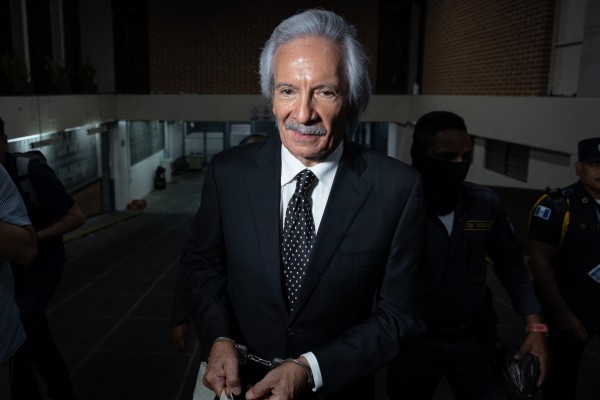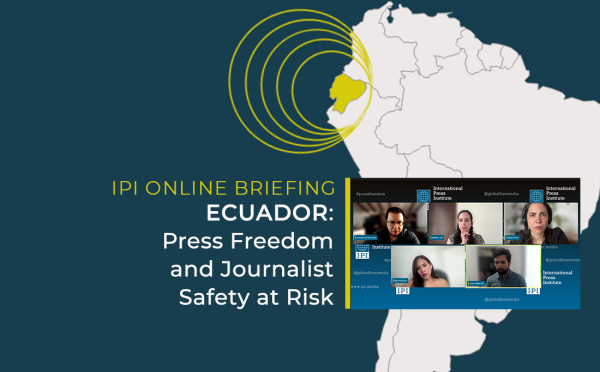H.E. Andrés Pastrana Arango
President of the Republic
Santafé de Bogotá
Colombia
Vienna, 1 July 2002
Your Excellency,
The International Press Institute (IPI), the global network of editors, media executives and leading journalists, strongly condemns the murder of a radio journalist in Arauca province.
According to IPI’s sources, Efrain Alberto Varela, who worked for a local radio station, Radio Meridiano 70, was travelling in his car with two relatives on 28 June when suspected right-wing gunmen stopped the vehicle in a rural road in Arauca, 280 miles (450 km) northeast of the capital, Bogotá. The men forced him out of his car and shot him several times as his relatives watched.
We are informed that Varela had received death threats from outlawed right-wing paramilitaries, who are fighting leftist rebels for control of drug crops in Arauca province.
Colombia has long proven to be the most dangerous country in the world to work in as a journalist. Particularly in the provinces, where vast areas are outside government control, journalists who attempt to expose illegal activities and corruption, or report on the country’s four-decade civil war, continue to face threats, harassment, physical attacks and death.
Increasingly, journalists are being singled out as “military targets” by the country’s armed groups – in particular the United Self-Defence Forces of Colombia (AUC), a right-wing paramilitary umbrella group, but also the two leftist guerrilla forces, the Revolutionary Armed Forces of Colombia (FARC) and the National Liberation Army (ELN) – who use intimidation and violence to ensure they are portrayed favourably by the media.
According to IPI’s statistics, at least 47 journalists have been killed in Colombia since January 1997. Last year, 11 journalists were killed, at least six of them because of their work. The death toll thus far in 2002 has now grown to seven. In addition to Varela, at least six other journalists have been killed this year.
Marco Antonio Ayala Cárdenas, a photographer for the daily El Caleńo, was shot dead on 23 January outside his newspaper’s office in Cali, Valle del Cauca province, by two individuals who were riding a motorcycle. The motive for the killing was unknown.
Orlando Sierra Hernández, deputy editor of the newspaper La Patria in the city of Manizales, Caldas province, died on 1 February from wounds inflicted by two gunmen on 30 January. Sierra, who was shot twice in the head and once in the abdomen as he entered his paper’s downtown building in broad daylight, was well-known for his ironic columns on official corruption and had received anonymous death threats. Police arrested both suspected gunmen.
Juan Carlos Gómez Díaz, an intern at the radio station La Voz de Aguachica, in Aguachica, Cesar province, was found dead in the Madgalena River, northern Colombia, on 3 April. He had been stripped and badly beaten. Two unidentified men abducted Gomez and a friend, Óscar Guerrero, on 1 April. The following day, Gómez’s father, Luis Alejandro Gómez, a journalist and announcer at the station for 25 years, received an anonymous call saying that his son had been killed and thrown into a nearby river. The intern’s death was blamed on right-wing paramilitaries.
Héctor Sandoval, a cameraman for RCN Television, and Wálter López, the television news crew’s driver, were shot on 11 April while covering fighting between the Colombian army and FARC guerrillas outside the south-western city of Cali. An army helicopter opened fire on their car, although the letters “RCN” were clearly marked on the roof and sides of the vehicle. López was killed instantly; Sandoval died early the next day.
Finally, Víctor Omar Acosta, a former correspondent for a number of Colombian newspapers and radio stations, was shot three times by unidentified gunmen in the city of Yumbo, Valle del Cauca province, on 14 May. Although Acosta had not worked as a journalist for more than two years, his family believes the attack may have been linked to his previous reporting on local corruption.
IPI urges Your Excellency to ensure that there is a thorough investigation into all of these murders and that those responsible are brought to justice. We further urge the Colombian government to take all possible steps to stop the killing of journalists and the alarming impunity that has accompanied these crimes.
We thank you for your attention.
Yours sincerely,
Johann P. Fritz
Director


